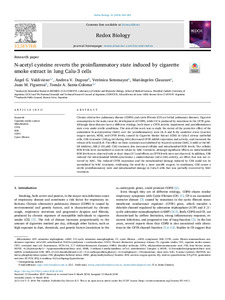Por favor, use este identificador para citar o enlazar este ítem:
https://repositorio.uca.edu.ar/handle/123456789/8661| Título: | N-acetyl cysteine reverts the proinflammatory state induced by cigarette smoke extract in lung Calu-3 cells | Autor: | Valdivieso, Ángel Gabriel Dugour, Andrea V. Sotomayor, Verónica Clauzure, Mariángeles Figueroa, Juan M. Santa Coloma, Tomás Antonio |
Palabras clave: | FIBROSIS QUISTICA; EPOC; ANTIOXIDANTES | Fecha de publicación: | 2018 | Editorial: | Elsevier | Cita: | Valdivieso ÁG, Dugour AV, Sotomayor V, Clauzure M, Figueroa JM, Santa-Coloma TA. N-acetyl cysteine reverts the proinflammatory state induced by cigarette smoke extract in lung Calu-3 cells [en línea]. Redox Biology. 2018;16:294-302. doi:10.1016/j.redox.2018.03.006 Disponible en: https://repositorio.uca.edu.ar/handle/123456789/8661 | Resumen: | Abstract: Chronic obstructive pulmonary disease (COPD) and cystic fibrosis (CF) are lethal pulmonary diseases. Cigarette consumption is the main cause for development of COPD, while CF is produced by mutations in the CFTR gene. Although these diseases have a different etiology, both share a CFTR activity impairment and proinflammatory state even under sterile conditions. The aim of this work was to study the extent of the protective effect of the antioxidant N-acetylcysteine (NAC) over the proinflammatory state (IL-6 and IL-8), oxidative stress (reactive oxygen species, ROS), and CFTR levels, caused by Cigarette Smoke Extract (CSE) in Calu-3 airway epithelial cells. CSE treatment (100 µg/ml during 24 h) decreased CFTR mRNA expression and activity, and increased the release of IL-6 and IL-8. The effect on these cytokines was inhibited by N-acetyl cysteine (NAC, 5 mM) or the NF-kB inhibitor, IKK-2 (10 µM). CSE treatment also increased cellular and mitochondrial ROS levels. The cellular ROS levels were normalized to control values by NAC treatment, although significant effects on mitochondrial ROS levels were observed only at short times (5´) and effects on CFTR levels were not observed. In addition, CSE reduced the mitochondrial NADH-cytochrome c oxidoreductase (mCx I-III) activity, an effect that was not reverted by NAC. The reduced CFTR expression and the mitochondrial damage induced by CSE could not be normalized by NAC treatment, evidencing the need for a more specific reagent. In conclusion, CSE causes a sterile proinflammatory state and mitochondrial damage in Calu-3 cells that was partially recovered by NAC treatment. | URI: | https://repositorio.uca.edu.ar/handle/123456789/8661 | ISSN: | 2213-2317 | Disciplina: | MEDICINA | DOI: | 10.1016/j.redox.2018.03.006 | Derechos: | Acceso Abierto | Fuente: | Redox Biology. 2018;16:294-302 |
| Aparece en las colecciones: | Artículos |
Ficheros en este ítem:
| Fichero | Descripción | Tamaño | Formato | |
|---|---|---|---|---|
| n-acetyl-cysteine-reverts.pdf | 1,16 MB | Adobe PDF |  Visualizar/Abrir |
Visualizaciones de página(s)
354
comprobado en 06-feb-2026
Descarga(s)
296
comprobado en 06-feb-2026
Google ScholarTM
Ver en Google Scholar
Altmetric
Altmetric
Este ítem está sujeto a una Licencia Creative Commons

